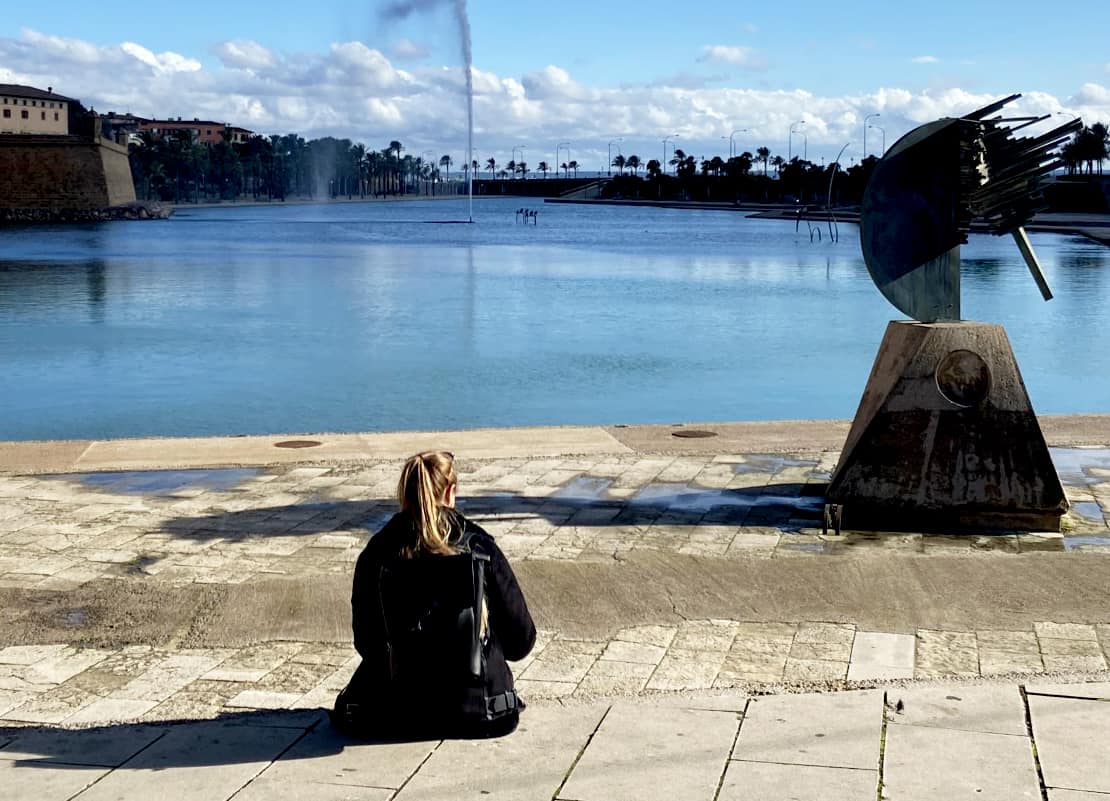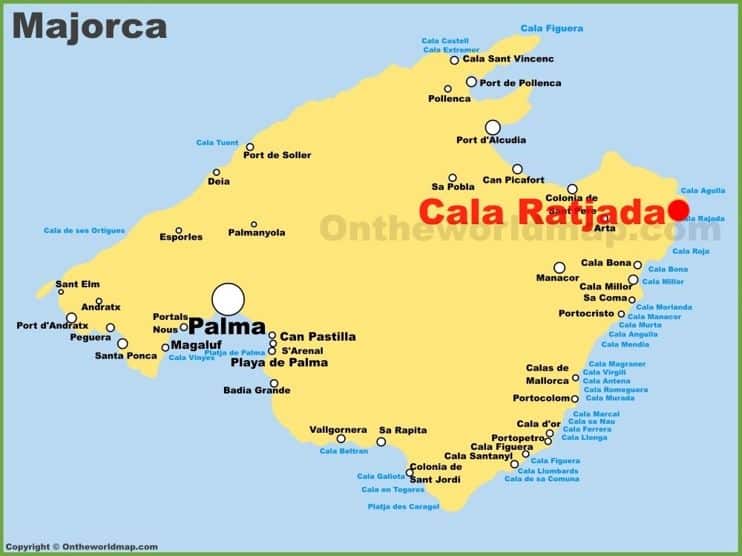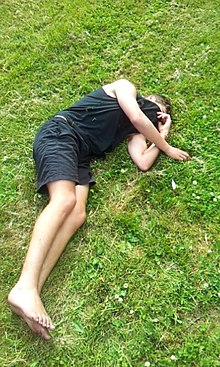Mallorca wants off-season visitors, bans summer binge drinking

(This is the last of a three-part series on the Spanish island of Mallorca.)
PLAYA DE MALLORCA, Spain – Changing an island’s image is much harder than a public figure’s. A person can make news in different ways. He or she can make a better movie or come out of rehab a new person. Plus, they haven’t been around all that long.
After all, they’re not as old as an island.
The Spanish isle of Mallorca is in the process of a facelift. It’s tiring of its image as Spain’s aging party girl when she has so much more to offer. Mallorca has been like this for half a century. Now Mallorca is doing something about it.
It’s making a major push to spread its mass tourism around the calendar. It wants more people to come in the off season and not pour in during the summer party months.
It should work. I can attest to Mallorca’s off-season appeal. I spent a week here in November for the Traverse21 travel bloggers conference. Yes, temperatures were in the 50s and it rained every day. I didn’t care. The capital of Palma de Mallorca is beautiful with plenty of history and culinary attractions. I tasted great wines at a winery in the countryside, hiked in a beautiful forest and explored a historic village.
But try getting that message across to the 11.8 million people who visited in 2019, 60 percent coming between June and September.
The plan
“Our idea is not only to increase the number of visitors that come in the off season but to send the message that Mallorca is much more than sun and beaches,” said Rosana Morillo, general director of tourism for the Balearic Islands which also govern Ibiza, Menorca and Formentera. “They shouldn’t come here just for our wonderful beaches. We would like people to come over the whole year and not to have such a huge amount of peaks during the high season.

“The experience of the visitor is much better.”
Mallorca’s problem is when people think of Mallorca they don’t think of its architecture, forests or nine Michelin-star restaurants. They think of drinking, parties, sex and mayhem.
I did. I have Italian friends who stumble back to Rome from August vacations to Mallorca with sheepish grins and headaches. Three years ago I chose instead to visit Menorca, Mallorca’s more mature little brother to the east, just to avoid the debauchery.
“The problem is the reputation damage to the brand of Mallorca,” Morillo said. “In terms of the number of people who come for the beach experience and drinking and whatnot compared to our total number of visitors is like nothing.”
She said the problem areas are concentrated on a couple of streets in the beach areas of Magaluf and Playa de Palma near Palma and also an area of Ibiza, the smaller island to the south.
“The problem is the media impact of anything that happens in these four or five streets is huge.” she said. “So people associate sometimes the brand of Mallorca with binge tourism or accepting alcoholic drinking. You know our island. You know that’s not what we want to sell.”
Tourism minister cracks down
While binge drinking may be limited to a small percentage of tourists, it was a big enough problem for Iago Negueruela, the Balearic Islands’ Minister of Tourism, to stand up at the World Travel Market in October and say things will change.
I was there in London where he said he’s working with the government of the United Kingdom, which sent 3.7 million tourists to the Balearic Islands in 2019, to get the message across about what he calls “Booze tourism”:
“That kind of tourism won’t be tolerated,” he said.

Javier Pascuet, the tourist board director for the town of Calvia’ which governs Magaluf, said it’s a problem that needed addressing.
“The problem was the drinking. But the problem was also all the side problems it was creating,” he told me in an interview. “Drugs. Prostitution. It was all around this area. Everything was dirty. We needed more police. We needed more cleaning. The strip was destroyed every day.”
Island tension
The government reacted to growing island tension. Mallorca tourism reached a point that was beyond sustainable. In 2019 this island of fewer than 1 million people received more than 1,094 flights a day to Palma’s massive airport during peak season.
Because so many people turned family housing into vacation rentals, the cost of living skyrocketed. In July 2018, protesting Mallorcans poured into Palma’s massive airport with signs reading, “One Airline Every Minute is Not Sustainable!” Signs outside vandalized hotels read, “Tourism Kills the City!”
Ciutat and Tot Inclos, two local citizens groups, declared a “Summer of Action” against the influx of tourists. The Socialist Party of Mallorca presented a proposal to the Palma city council to curb booze cruises.
The new rules
The Balearic government listened. In January 2020, it issued the following restrictions:
- Ban on Happy Hour and any activities encouraging binge drinking.
- Ban on pub crawls.
- Ban on all-you-can-drink pricing.
- Ban on party boats advertising.
- Ban on stores selling alcohol between 9:30 p.m.-8 a.m. Fines range from 6,000-600,000 euros or closure for three years.
- Ban on vending machines selling alcohol.
- Limit to six alcohol drinks per day in all-inclusive resorts.
- Ban on balconying, the practice of jumping from balcony to hotel pools or other balconies which has resulted in numerous deaths. Fines up to 60,000 euros.
The law, which will be in place until 2025 and perhaps longer, states: “People, who, despite the law, carry out these practices, will be expelled immediately from the establishment and the action will be treated as a serious offence, both for those who practice it and for those who allow it.”
These were the first laws in Europe to restrict the promotion and sales of alcohol in tourist zones. When the restrictions came into law, Negueruela said, “What has been going on has got to stop and we intend to do just that with this new law. There is so much more to both Majorca (Spanish spelling) and Ibiza than booze tourism.”
Mallorca, however, must walk a precarious line between its economy and sustainable tourism. Of Mallorca’s 923,000 people, 200,000 jobs are in tourism. The tourist industry makes up 25 percent of the island’s economy.
Bar and hotel owners complained that the enforcement of the laws is only on certain streets, allowing establishments in other areas to take away their thirsty customers. Said Christoph Grawert, owner of the hotel Samos, to the website Get to Text last year: “Picasso could not have done better in its most cubistic phase.”
The impact
How much of an impact have the restrictions had? A lot. But it needs more time. Three months after the regulations took effect, Mallorca went into Covid lockdown that March. The Balearic Islands could only really start enforcing them this year.
Still, Pascuet said that the number of visitors practicing “excess tourism,” defined as staying at hotels and visiting bars promoting it, dropped from 10,000 a day to 6,000 or fewer. It also helps that they only accept British visitors who are double vaccinated. That rules out thousands of young adults.
“It’s linked to this tradition from the UK to go to Magaluf and get shitfaced, basically,” Pascuet said. “The thing is, club owners, some of them realized that regulations make them change their business model. As much as they started changing their offer, they realized that they changed the type of customer they have. They can sell more expensive and get a little more added value.”
Also, the number of Magaluf’s cheap, 3-star hotels, which would offer an all-inclusive week for food and alcohol for only 300 pounds (about $400), have dropped with the ban of all-you-can drink all-inclusives. The number of 4- and 5-star hotels have jumped to 70 percent of the accommodations.
Flights and communication
If more people came in the off season, their worries would be solved. Morillo said studies showed people who come in the off season spend similar amounts to people in high season. She told me there are two ways to make this happen.
“One, ensuring they have the flights in the off season,” she said. “If there is no connectivity, it’s very difficult to come to Mallorca and the Balearic Islands in the off season. The other thing is communication. Communication. Communication. Communication. A place on the social market to make sure they know about the terrific offers the island has in the off season like sports, nature, etc.”
Her advice to all those who want to take my advice and visit in the off season and avoid the partying mobs: After Easter and before summer and also September and October.
If you would like to go …
How to get there: RyanAir has round-trip flights from Madrid to Palma de Mallorca starting at 57 euros. However, RyanAir also charges for any bags and sometimes seats.
When to go: Average temperatures in November are 50s and low 60s with about six days of rain. (I received all six.) In July its 70-85 with no rain.
Where to stay: BQ Augusta, Corb Mari 22, Palma, 34-971-700-813, BQ Hoteles: Mallorca or Andalusia, Augusta@bqhotels.com. I paid 68 euros a night. In July it jumps to 260 euros for a minimum two-night stay.
Where to eat: Celler sa Premsa, Placa del Bisbe Berenguer 8, Palma, 34-971-72-3529, CELLER SA PREMSA – Restaurante de cocina mallorquina, mail@cellersapremsa.com, 12-4, 7:30-11:30, closed Sunday. Located in city center, best place in town for local cuisine.
Casa Jacinto, Cami Tramvia 37, Palma, 34-971-40-1858, www.casajacinto.es, casajacinto@gmail.com, 1-5 p.m., 7 p.m.-midnight. A meat lover’s paradise away from the tourist mob.
For more information: Consell de Mallorca, Placa de la Reina 2, Palma, 34-971-17-3990, 8:30 a.m.-67 p.m. Monday-Friday, 8:30 a.m.-3 p.m. Saturday.
Magaluf Tourist Office, 34-971-13-1126, Av. Magaluf 22, Calvia’, Visitcalvia.org, 9 a.m.-3 p.m. Monday-Friday, Visitacalvia.org, Ice@calvia.com.


December 10, 2021 @ 1:24 pm
I wish Britain would do more to change its drinking culture. It is abusive enough to experience it in Britain, even more disgusting to encounter it in other places. I’ve encountered drunken British groups in Prague, in Rome, in Madrid…the list goes on. I wish Mallorca good luck.
December 11, 2021 @ 7:06 am
Italy won’t tolerate it and wine is removed from the table in Italian restaurants if it gets raucous. It isn’t just teenagers as many middle class people (who can afford luxury hotels) binge drink. I spend part of my summers in Menorca but the international clientele keep things enjoyable but calm. Mallorca has some beautiful places far away from the crowds